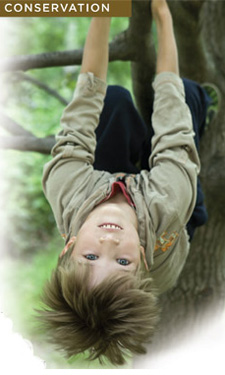
It is a wholesome and necessary thing for us to turn again to the earth and in the contemplation of her beauties to know of wonder and humility – Rachel Carson
Recently, my father reminded me that on the day I was to leave for college, to go from the rural countryside where I grew up to The Ohio State University, the largest campus in the world where I barely knew a soul, I disappeared for hours. I had wandered out our back door after breakfast with no defined intention, but with distinct impulse. I meandered across the fields and into the woods. I tramped deep among the white oak and shagbark hickory nearly a mile to the creek. I climbed a favorite sycamore and lay on its lowest branch, listening to the brook, watching the water play around the rocks, glint in the sunshine. The entire morning I watched minnows swim, crawdads dart through the silt, leaves float by, spinning along the current. Later that day my life was to change as dramatically as any day since. I had come to the woods to gather myself, to steel my values, and, immersed in the serenity of the great trees and wandering stream, to become exactly who I was.
I returned to water, trees, and animals. Water is the most alluring element in nature. Water sustains us, fills us. We are of water, and when walking along a creek or paddling on a lake, we feel the communion. Trees stand as we do, yet tower beyond us. They reach toward the sky in a metaphorical thrill of our aspirations and strength. Squirrels and birds remind us of ourselves.
How disheartening to think that we become so overwhelmed and distracted with our schedules and stresses that we forget how the woods or a stream soothes, rejuvenates, and inspires us, how our minds calm and clear, how our frustrations and challenges erode to expose our simple values and dreams. From our lives so littered with distractions and details, we must walk a long path. Mundane squabbles and predicaments fall away to banality. We emerge instead as our primal and beautiful selves.
In life’s most dramatic periods—birth, death, marriage, upheaval—we are most open to, or perhaps most in need of, the cathedral of nature. Nature is one of the few settings that offer dignity fitting of our deepest values and most intense emotions. In those momentous times, we’re compelled to return there, to dwell for a time among the trees and wildflowers, ponds and streams, birds and fish. Nature swells a spiritual courage in us large enough to celebrate joy or embrace heartbreak.
Children’s lives are innately momentous. But children are growing up now without ever knowing the wonder of finding a downy nest of rabbits, the intimacy of watching a frog blink, the invincibility of perching high in a tree. Children have the innocence and instinctual wisdom to recognize themselves in nature, no different than a dragonfly or a trillium. But children need nature before they grow too wired to understand, too old to know where to return. They need the woods and a hillside and a creek, not just on a nature walk with a quiz to follow; they need nature on their own terms. They need to meet the animals and plants, water and soil to develop their own friendship, their own love and commitment. As adults, we must lead them there, and then quietly step aside. As professionals, we have a more profound obligation.
As leaders in parks, conservation, and recreation agencies, as keepers of our community’s land, we are in the unique position to offer nature, for the land is where nature resides. We are in the position to preserve nature within the fabric of our communities so that people can reach its refuge on a Tuesday evening or a Saturday morning. Within our neighborhoods, we can give children places to roam after school where they’ll find the depth of their soul and the height of their imagination. Given the social issues surrounding our profession today, we must work to offer the vigor and serenity of a day spent among tall trees, a frolicking stream, and the venerable and wide-eyed beasts of the forest, to offer the opportunity to feel again that we, too, are nature.
Carrie Scarff is Deputy Director of Five Rivers MetroParks in Dayton, Ohio.

